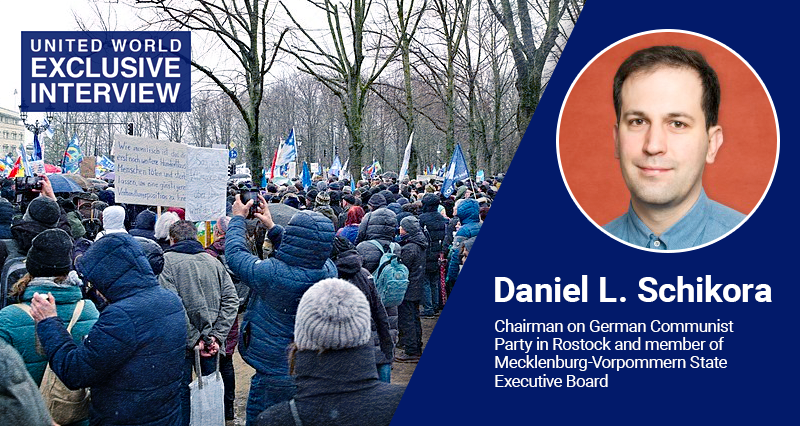By Can Çakır
Last week, demonstrations against NATO were organized in various countries in Europe. The demonstrations held NATO responsible for the war in Ukraine and criticized the anti-Russian campaign. Different political currents denounced their governments for tailing the US-led war and putting the economic burden of the war on the people.
One of these demonstrations, where the German Communist Party (Deutsche Kommunistische Partei, DKP) was a participant, was held in Berlin on February 25th.
Chairman of DKP in Rostock and member of the Mecklenburg-Vorpommern State Executive Board Daniel L. Schikora gave an interview on the background of the gathering to UWI.
Three political currents skeptical to NATO
What is the basis of the critical attitude to NATO in Germany?
The skeptical attitude to NATO in the German population, which can be found in left-wing, liberal, conservative and right-wing nationalist circles, traditionally emerges from three different political currents: A pacifist one in the broadest sense, which in principle regards war as a means of politics as a no-go; secondly a ‘national-neutralist’ one which regards Germany’s national interests (including those of the old Federal Republic of Germany) running counter to the hegemonic airs and graces of the leading NATO power, the US; and thirdly an anti-imperialist one, which sees itself in solidarity with the victims of US imperialism and its allies. In the present situation there is more than ever a chance to programmatically bring together anti-militarist, anti-imperialist and socially driven protests.
Incompatibility of NATO and Germany’s sovereignty
Do you think that NATO is a threat to Germany’s sovereignty?
NATO and Germany’s national sovereignty are incompatible in principle. This can be plainly seen even only from the openly aggressive stance of the leading NATO power US on Nord Stream and on German-Russian (and German-Chinese) trade relations.
Political conflict within the German government
Does the German government supply weapons to Ukraine because of pressure from NATO and the US?
The arms deliveries as well as the political campaigns propagating their ‘normality’ serve not only the military-industrial complex of the US, but also that of Germany. However, it is noteworthy that the moderate parts of the German government are visibly coming into political conflict with Washington, London and even with fanatic advocates -Foreign Minister Annalena Baerbock is one of them – within the government who seek a closer alliance with the US on the question of when, to which weapons and for what purpose to deliver the Kiev junta.
The success of the ‘narrative on Russian warmongering’
How does the German population perceive the sanctions against Russia? What impacts do the sanctions have on Germany?
Unfortunately, the rulers have succeeded in convincing the majority of the population, even the peace movement camp, of their narrative on Russian warmongering. According to recent polls, a narrow majority even favors tougher anti-Russian sanctions. Embedded in a strategy of ‘decoupling’ from Russia and, prospectively from China, these sanctions must be seen as a catalyst for the tendencies toward de-industrialization in the Federal Republic of Germany. Ironically, in face of the energy price hikes associated with this policy, the leading German media are now focusing on the misconduct of so-called German energy transformation, especially the withdrawal from the peaceful use of nuclear energy -a decision that isolated Germany in the EU in particular.
From public discontent to denouncement of warmongers
What should be the following steps to be taken?
The coming weeks will show to what extent the forces in NATO and EU that count on the ‘victory for Ukraine at any price’ -any price including the direct involvement of their own countries in the war- will prevail. On the other hand, there are states such as Türkiye or EU member Hungary. Both are opposing the inclusion of Sweden and Finland into the war alliance. Both are considered ‘sand in the gears’ of the ‘Euro-Atlantic security structure’ from the point of view of the most aggressive advocates of ‘suppressing Russia’. China has now openly placed itself at the forefront of a peace camp that opposes the warmongers in Washington and Brussels. China is promoting negotiated solution that also takes Russia’s security interests into account.
In our country, the most consistent anti-imperialism, including our party, must work harder to convert the general discontent in public against warlike escalation into a denouncement of the warmongers of the US and NATO. Thus, we can contribute to the struggles of peoples who have not submitted to imperialism and the ones who uphold the principles of international law such as China in the face of separatists in Taiwan.
















Leave a Reply